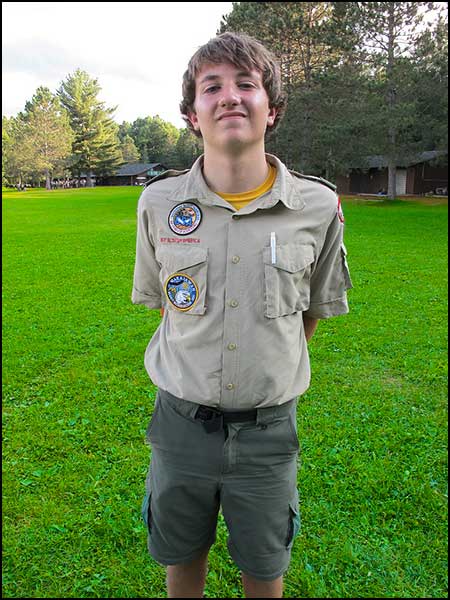
Fly Like an Eagle
Brian’s Eagle Scout Court of Honor took place last June in the sunny basement of a church outside Chicago. Jim sent me an invitation in April to attend this award ceremony, as well as a round trip ticket to get there.
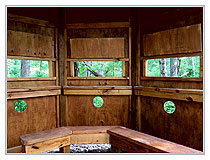 It took years of hard work for Brian to earn that Eagle Scout medal — the seventh and highest rank in the Boy Scouts of America. He designed and built a bird-viewing shelter in a local forest preserve in order to satisfy its final, Herculean requirement.
It took years of hard work for Brian to earn that Eagle Scout medal — the seventh and highest rank in the Boy Scouts of America. He designed and built a bird-viewing shelter in a local forest preserve in order to satisfy its final, Herculean requirement.
Jim and I had been Scouts 40 years before and were glad when his son decided to join the movement: Scouting got Brian out of the house and into nature where he mixed with other boys. He learned leadership and survival skills and was introduced to dozens of possible career opportunities by earning boy-friendly merit badges.
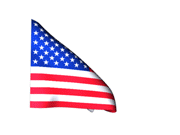 John F. Kennedy, Paul McCartney, Steven Spielberg, Bill Gates, Neil Armstrong, Johnny Cash, Jim Morrison and Jimi Hendrix were all Boy Scouts. They, and a million others, were proud to have been part of an international youth movement that has made the world a better place.
John F. Kennedy, Paul McCartney, Steven Spielberg, Bill Gates, Neil Armstrong, Johnny Cash, Jim Morrison and Jimi Hendrix were all Boy Scouts. They, and a million others, were proud to have been part of an international youth movement that has made the world a better place.
Things were hectic at my workplace prior to the Court of Honor. AMEREM, an international gathering of electromagnetic scientists, was fast-approaching and my job as its webmaster and graphic artist was becoming an all-consuming task. There were banners to make, a program book to write and a website that needed constant updating.
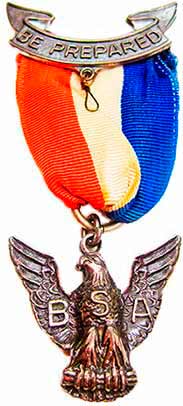 Even so, I asked my boss for a week off to celebrate this important occasion. I knew that he was short-handed, but he saw how much this event meant to me and said I could go.
Even so, I asked my boss for a week off to celebrate this important occasion. I knew that he was short-handed, but he saw how much this event meant to me and said I could go.
The morning of my departure dawned and I was awoken at 3 a.m. by my iPhone’s distinctive ring. I made my bed, shaved, prepared a quart of oatmeal for breakfast and was out the door by 5 a.m., rolling my bright blue carry-on down the dark and deserted streets of Albuquerque’s downtown.
I arrived in the parking lot of the Downtown Inn at 5:15 and waited on Old Highway 66 for the Sunport Shuttle to pick me up. And waited. And waited. And waited.
At 5:25 I nervously called the dispatch office. There had been a problem with their van and they sent a cab to fetch me in its place. I finally arrived at the airport at 6, eager to board the “red eye” to Chi-town.
I made it through security by 6:45 and found out, much to my horror, that my 7:30 flight had been cancelled! I couldn’t understand how a flight could be cancelled on such a beautiful, sunny day.
A mechanical problem was the culprit and now 175 desperate people had flooded the system and were trying to get to Chicago at the very last minute. How difficult can that be, I chuckled.
Southwest had announced the cancellation at about 5 a.m. but I had not taken the time to check my plane’s flight status before I left home. It would have been so easy because my iPhone has an app for that. I could have just pressed the app icon on the screen, put in my flight number and I would have known about the problem.
Jim received an e-mail notification about the cancellation because he had paid for my flight and he urgently called at the exact moment that my iPhone was passing through the X-ray machine to alert me — so I missed his call.
“I don’t know why I gave you that phone. You never use it!” he texted me severely.
I don’t know why he gave me that phone either, but I was glad he did.
I was grateful for the phone but didn’t deserve his reproach, I thought to myself indignantly. I use that phone constantly: I use its calendar, I check my e-mail, I text and I regularly use its GPS feature to catch city buses. I listen to NPR podcasts and read the New York Times.
I walked calmly over to a Southwest Airlines gate, explained my situation and asked the lady if she could please get me to Chicago.
“Sorry,” she said. “All our flights to Chicago are booked solid. We might be able to get you on a plane tomorrow.”
“But I need to get to Chicago today,” I whined.
She reached for an empty ticket folder, circled an 800 number and thrust it into my hands. “Call this number. They might be able to help you. I can’t.”
Now I was pissed: I had spent $12 to get to the airport, I had made my way through security, I was supposed to be in Chicago in a few hours and now it looked like I wasn’t going anywhere.
I wheeled my bright blue carry-on up an elevator and into the Sunport’s observation deck, with its enormous glass-covered walls, where I would be able to rebook my flight in a pleasant, secluded atmosphere. I sat at a long table where I plugged my quickly-draining iPhone into an electrical outlet. The arriving and departing passenger jets and Air Force planes were a welcome distraction from what was looking increasingly like a hopeless situation.
I called Southwest Airlines and was put on hold for ten minutes but I persevered. An operator finally answered and I explained my situation: I asked her if there was some way she could get me to Chicago today.
She said planes to Chicago were 100 percent booked and added that people were waiting on standby at all the major airports — and some of those lines were eight deep. I told her to keep digging as I hunkered down in a comfy leather seat and watched, in air-conditioned comfort, as the airplanes took off and landed, one after the other.
Ten minutes went by. Twenty minutes. The agent on the phone tried every possible connection but no dice. Finally, she said there might be one possible way she could get me on a plane but it would require “double-booking.”
“I’m not allowed to double-book,” she said. “But let me talk to my help desk. They might be able to figure something out.”
I waited another ten minutes. Finally she came back on the line and said that she could get me to Chicago if I was willing to fly to Dallas, jump on a plane to Houston and then catch another plane to Chicago.
Well, I thought: so much for my non-stop flight.
I texted Jim to ask him whether he was willing to pick me up at Midway at 10 p.m. and received no response.
I checked the Chicago Metra schedule and saw that commuter trains were running until midnight … and I could always hail a cab if that didn’t work out.
“I’ll take it!” I told the Southwest ticket agent. “Double-book me!”
She booked the flight over the phone and e-mailed me a confirmation number. I gave that confirmation number to the lady at the gate and asked her to print me some new tickets.
“It looks like you’ll be travelling all over the country, but you done good,” she said in astonishment.
“There’s no way you can get me on the next plane to Chicago is there?” I asked in a final, desperate, pleading voice. “I didn’t tell you I was a travel writer, did I?” I said as I pulled out that wildcard, thinking that an old cruise ship story that was picked up by the Los Angeles Times might save the day. But newspapers aren’t what they used to be and my words fell on deaf ears.
“No, you didn’t tell me that,” she said flatly, “and no, that won’t help you. You’re not going to do any better than what you’ve got now and you’re lucky to have that.”
I texted Jim about my status and he fired back “OK” when I asked him if he would meet me at Midway airport.
I approached a Southwest Airlines pilot who was sitting behind a reservation desk in a neatly-pressed white uniform. He said the thing that amazed him so much about planes was not that they could fly, but how the fuel could create enough energy to lift so much weight. The pilot said that planes these days “pretty much fly themselves” and that it was a good thing to have humans in the cockpit. He said that if it came to the point where planes were going to fly themselves without people behind the controls, “the pilots union would have something to say about that.”
I asked him how Southwest Airlines was doing and he said that although the stock was doing well, they weren’t making very much off the customers because of the high price of fuel. “Maybe a few bucks each and that’s ridiculous.” Further, he said that safety was the company’s highest priority and the employees are encouraged to report anything that might compromise safety. “I’ve got a couple children,” he said. “I’d like to see them grow up and that’s why your flight was cancelled.”
My flight to Dallas began boarding at 12:30 and we were in the air shortly thereafter. Blue skies 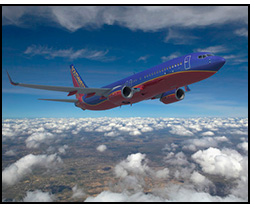 turned into skies filled with massive, billowy clouds as well as some that were flat as a pancake, dividing the sky in half like a knife.
turned into skies filled with massive, billowy clouds as well as some that were flat as a pancake, dividing the sky in half like a knife.
I sat next to a 15 year old, home-schooled girl who lived outside of Waco, Texas. She talked my ear off, philosophizing about the uniqueness of people in general, classic rock versus Justin Bieber, and old rotary telephones. Her mother sat in front of us with one ear tuned closely to our conversation. The flight went by quickly and I enjoyed listening to her endless chatter. At the end of the flight, when I wished the girl farewell, her mother turned to me and said, “Thank you.”
Upon our arrival in Houston we learned there was “weather” in Chicago and that air traffic control was “holding” all incoming flights. Yet more delays. I texted these facts to Jim and he replied, “OK, let me know what happens.”
I wheeled my bags to the airport Subway restaurant and studied the menu carefully. Then I asked the friendly lady behind the counter if I could have some sort of chicken sandwich and she said she had five varieties of poultry to choose from.
I picked the teriyaki chicken on garlic bread with Swiss cheese and veggies (with no jalapeños!). I asked for extra napkins and a fork. I carried everything to the gate, plopped down on the carpeted floor and ate my sandwich while my iPhone was blissfully charged from a nearby outlet. After I finished the sandwich, I cleaned my mouth with non-perfumed baby wipes and headed to the bathroom where I flossed and brushed my teeth.
The plane, destined for Chicago, finally began loading and I managed to squeeze into a space in the back of the line with my C-20 boarding pass. When I reached the door of the plane I was told that I would have to check my bag because the overhead compartments were full.
“Will I ever see my bag again?” I asked an attendant who handed me a hand-written receipt that had zero credibility in my fatigued mind. I was furious because I generally go to great lengths not to check my bag.
I needed to vent to somebody so I decided to lay it thick in the form of an anxious text to Jim. “Flight is packed,” I wrote. “They took my luggage away because there was no room in the overhead compartment. I will have to go to baggage claim to retrieve my bag. Plane is closing doors now. OMG!” I moaned.
Jim texted back in his inimitable, sarcastic tone, “Oh what a shame…They took your huge carry-on bag… They should always make you check your big bag!”
We experienced a rocky landing at Midway Airport an hour late, after flying through a massive thunderstorm. A dozen other airplanes also landed at about the same time, after having circled the airport for hours, waiting for the weather to clear.
Suddenly the plane stopped dead in its tracks and shut down its engines after taxiing down the runway for a few minutes. The temperature and humidity in the cabin slowly began to rise. The bible-toting, computer solitaire-playing lady next to me picked up a copy of a magazine that was tucked inside the pocket of the seat in front of her and began to furiously fan herself. Blessed wafts of cool air drifted in my direction as the captain came on the intercom.
“On behalf of Southwest Airlines, I’d like to welcome you to Midway Airport. Unfortunately our gate is currently occupied so we can not deplane at this time. We appreciate your patience and hope that a gate will open up for us soon.”
We spent the next half hour sitting on the tarmac. It was so late now and the train had surely ceased running. I started to frantically text Jim, wondering if I would have to hire a cab to get to Highland Park. He mysteriously replied, “OK.”
I urgently started googling cabs and shuttles. I feared the worst as my imagination ran wild: Jim had given up on me and had decided to call it a night. Or he was sitting in a bar having a drink (or two or three) with a friend and could not get behind the wheel.
The plane rolled into a gate at 12:30 a.m. What should have been a two hour flight had turned into an 18 hour ordeal, but I had finally arrived in Chicago, safe and sound. Midway Airport, generally a fairly quiet place at that hour, was now bustling with activity as hundreds of weary passengers exited their planes.
Sleep-deprived and exhausted, I resigned myself to whatever else fate could throw my way and headed to baggage claims to pick up my bag. What more could possibly happen at this point? Maybe my luggage would be lost … that would be the icing on the cake.
But as I approached baggage claims I was greeted by two beautiful sights: The first was Jim, sitting on the floor, his back propped against the wall, focused on his smart phone.
The second was my bright blue luggage rolling around the carousel.
The rain started falling heavily as we drove the requisite 50 miles to his home outside of Chicago.
“It would have cost $100 if you had taken the cab,” he said.
 He noticed that I was eyeing the stationary wipers on his Mercedes G-Wagon. “The wipers stopped working … well, they operate intermittently and I really don’t need ‘em. I put some Rain-Ex on the windshield and look how well the water beads up!”
He noticed that I was eyeing the stationary wipers on his Mercedes G-Wagon. “The wipers stopped working … well, they operate intermittently and I really don’t need ‘em. I put some Rain-Ex on the windshield and look how well the water beads up!”
It was a long drive and I was glad to get home. Brian was sleeping over at a friend’s house and Jim gave me his room to sleep in. I glanced around the room and saw a book on pyramids that I had once given him.
I had forgotten how quiet and still it could be by Lake Michigan at that hour. I had not experienced such peacefulness in a long time and slept until 9 the next morning.
Since Jim had to be at his factory that day, we grabbed some food and headed to Lake Bluff, Illinois. I settled into Jim’s office while he busied himself with other things. He had asked me to help with preparations for Brian’s Court of Honor so I created a program for the ceremony and then I prepared formal scripts for the five people who had lines to recite during it. I knew I wouldn’t be able to memorize my 750 words and figured the others were in the same boat.
 In preparing the other scripts I enlarged the font size from 9 to 18 point so the speakers could easily read their parts. But I increased the size on my script to a hefty 24 points (1/4” inch tall) so it looked (to me) like the words on a teleprompter. I did not want the audience to think I was reading my speech and this would help me accomplish that. Jim nixed that formatting on the other scripts saying the type was ridiculously large but I kept mine at 24 points.
In preparing the other scripts I enlarged the font size from 9 to 18 point so the speakers could easily read their parts. But I increased the size on my script to a hefty 24 points (1/4” inch tall) so it looked (to me) like the words on a teleprompter. I did not want the audience to think I was reading my speech and this would help me accomplish that. Jim nixed that formatting on the other scripts saying the type was ridiculously large but I kept mine at 24 points.
Brian’s Court of Honor took place in the basement of a church in Deerfield, Illinois. The air was warm and the sun was shining. As the appointed hour drew nigh, 40 people descended into the underground room for the sole purpose of honoring Brian, who was decked out in his crisply pressed green shorts, knee socks, tan shirt and a broad sash filled with 26 merit badges that bore testament to his dedication to the Scouting movement.
After everyone was assembled and had taken their seats the honor guard entered the room carrying the American and Troop flags. They moved to the front and the leader led the guests in reciting the Pledge of Allegiance and the Boy Scout Oath. It had been decades since I had recited those words and they came back to me effortlessly, except this time around they seemed more than just empty words that I had spoken a thousand million times.
It was nearly my time to stand before the audience and deliver my speech. I proudly wore my Eagle medal which I had earned four decades ago. It had been stashed away all this time in my safe. The silver had developed a slight patina and the ribbon looked a bit tired next to the shiny Eagle medals of the boys that surrounded me. Hell, I must have looked weathered as well — being over three times their age — but age has a way of lending a certain dignity and wisdom to such occasions.
I knew my speech well, although I had not memorized it. I had read it out loud at least a dozen 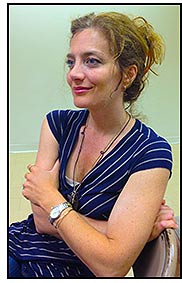 times: I had practiced it at work, on the bus, at the airport, on the airplane … during every free moment. People must have thought I was crazy but I was determined not to stumble on any of the “big words” — any word over two syllables — as I have been guilty of doing ever since I broke my jaw a couple years ago. I don’t do public speaking very often and, although this was a small venue, I knew that this was going to be one of the most important speeches I would ever deliver.
times: I had practiced it at work, on the bus, at the airport, on the airplane … during every free moment. People must have thought I was crazy but I was determined not to stumble on any of the “big words” — any word over two syllables — as I have been guilty of doing ever since I broke my jaw a couple years ago. I don’t do public speaking very often and, although this was a small venue, I knew that this was going to be one of the most important speeches I would ever deliver.
The fact that I had not written this speech (the “Eagle Charge”) made it doubly-challenging. I could see that the words were well-thought out and I wasn’t about to edit them. But in order to succeed I needed to feel comfortable and confident with the words themselves, as well as the meaning behind those words. And I had to deliver that speech in a way that would evoke an emotional response from the audience. Fortunately I have had some excellent theatrical training and it was now going to come in handy.
But, there was a problem: As I sat waiting for my turn to speak I began to notice an excruciating pain in the ball of my right foot. When I removed my sock I was shocked to discover a sliver of glass embedded in its weave and it was saturated with blood.
The glass had slashed the bottom of my foot. The scoutmaster, a jovial man who wore his blond hair in a crew cut, noticed that I was in distress, led me into the empty equipment room and told me to take a seat. He calmed me down, cleaned the wound, found a first aid kit, applied antiseptic ointment and put on a bandage. Within minutes I was right as rain and ready to perform the “Eagle Charge.”
Here is a brief extract from my speech:
“Brian, you have been judged by the Boy Scouts of America as worthy of the highest rank in this great movement. All who know you rejoice in your achievement … I charge you to be among those who dedicate their skills and ability to the common good … Whatever others may do, leave behind a record of that will make every other Scout justly proud.”
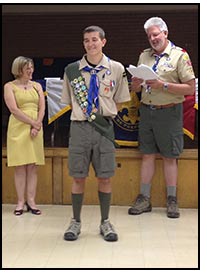 My speech was followed by a few others, notably the scoutmaster who has been so instrumental in shaping the boys of Troop 150 into a lean, mean scouting machine.
My speech was followed by a few others, notably the scoutmaster who has been so instrumental in shaping the boys of Troop 150 into a lean, mean scouting machine.
After all the speeches had come and gone, the time had arrived for Brian to receive his Eagle medal. His mother lovingly pinned the award on his left breast.
The Eagle Scout medal hasn’t changed much since it was designed in 1910. The words “Be Prepared” are embossed on a pewter scroll at its top. A tiny noose, made of fine silver thread, hangs from the scroll’s center. A long triangular satin ribbon with red, white and blue vertical stripes is suspended from the corners of the scroll, and dangling from the ribbon’s bottom apex is a sterling silver bald eagle with the letters BSA engraved on its chest.
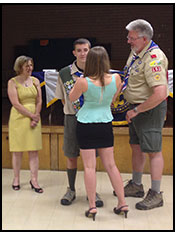 Brian’s sister and dad also played a part in the ceremony. They “dressed” Brian in his Eagle neckerchief and a slide to hold it in place. Brian stood in front of us, at ease, taking all the compliments with dignity and grace. We were all so proud of him and he was positively beaming. Then he approached the podium, delivered a lovely speech and thanked everyone who had played a role in his great accomplishment.
Brian’s sister and dad also played a part in the ceremony. They “dressed” Brian in his Eagle neckerchief and a slide to hold it in place. Brian stood in front of us, at ease, taking all the compliments with dignity and grace. We were all so proud of him and he was positively beaming. Then he approached the podium, delivered a lovely speech and thanked everyone who had played a role in his great accomplishment.
Meanwhile, I was shamelessly slinking around the floor with my iPhone, taking photographs of him from every possible angle. I have not always been a photographer but lately, one of my responsibilities at work has been to document the various events that take place in my department. I learned pretty early on that there is no way to get a decent picture of a person without getting right into the faces of provosts, presidents and deans. I learned quickly that there is no such thing as a shy photographer and that one must do whatever needs to be done to get a good picture because you rarely get a second chance.
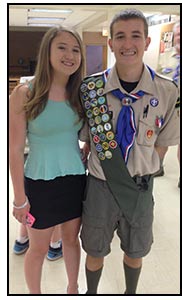 And so, as I was shamelessly crouched on the ground, trying to find that perfect angle, I heard Brian say in a loud, firm voice, “Charles Reuben, will you please come forward.”
And so, as I was shamelessly crouched on the ground, trying to find that perfect angle, I heard Brian say in a loud, firm voice, “Charles Reuben, will you please come forward.”
A bit startled, I ceased my voyeuristic shenanigans, put the iPhone away and brushed myself off. As I walked sheepishly toward him, he began speaking to an audience that seemed as shocked as I was.
“I have known Chuck for as long as I can remember — ever since I was a little boy. He is a friend of my father’s and has always been there for me, setting an example and giving me somebody to look up to. And so I would like to award Chuck with this Eagle Scout Mentor Award, in appreciation for him having come here, all the way from Albuquerque, New Mexico, just to attend and take part in this ceremony.”
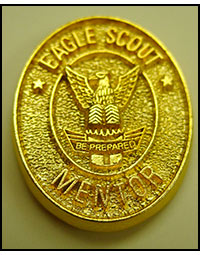 Brian then took a gold medallion, about the size of a dime and pinned it carefully to my shirt, next to my Eagle medal. This was totally unexpected and I felt proud as a peacock: A Pulitzer Prize would not have given me as much pleasure as that little gold pin.
Brian then took a gold medallion, about the size of a dime and pinned it carefully to my shirt, next to my Eagle medal. This was totally unexpected and I felt proud as a peacock: A Pulitzer Prize would not have given me as much pleasure as that little gold pin.
Over the years I thought Brian had taken me for granted and never noticed or cared about the occasional gifts and kind words that I had sent his way. In that moment of my “pinning,” however, I realized two things: First, that he did not take me for granted at all. And second, that it is hard for us males to publicly show our affection for each other. So we construct these elaborate ceremonies, with our awards, pins, badges and plaques to say what resides in our hearts; and in this way, we are able to express what, for us, seems incommunicable.
Children grow up so fast, but make no mistake: The stories we tell, the books we read, the adventures we share and the time we spend with them is not wasted. Indeed, the time that any adult unselfishly spends with a child may turn out to be some of the most meaningful and memorable of their lives.
This is not to say that I am a saint, nor do I mean to represent myself as such. Brian and his sister have seen me in a variety of embarrassing situations and I’m hoping they were able to learn from me about things they ought not to do, along with things that might improve their lives.
Eventually the part of the ceremony arrived when it was time for the color guard to fetch the flags and 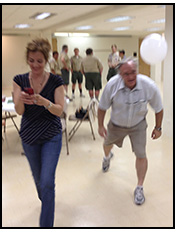 put them back into storage. They did that with much pomp and circumstances and then the master of ceremonies announced that the Court of Honor had come to an end. A solemn benediction was recited and we were all thanked for attending and invited to enjoy refreshments that lined a table in the back of the room.
put them back into storage. They did that with much pomp and circumstances and then the master of ceremonies announced that the Court of Honor had come to an end. A solemn benediction was recited and we were all thanked for attending and invited to enjoy refreshments that lined a table in the back of the room.
Justice was done to the refreshments — a large chocolate chip cookie cake and other assorted delights — by the 40 hungry attendees. While the organizers were busy putting chairs and tables away and removing bunting and decorative elements from the room, a furious balloon game commenced in the back of the meeting hall. 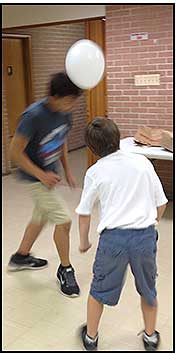 Boys formed a circle and began kicking around a balloon. I decided to join in and before long our circle included moms, dads, and assorted teenagers. Eventually we all grew weary of the game, collected our things and went home.
Boys formed a circle and began kicking around a balloon. I decided to join in and before long our circle included moms, dads, and assorted teenagers. Eventually we all grew weary of the game, collected our things and went home.
As rites of passage go, this was a good one – maybe the best. After all, only six percent of all Boy Scouts make it to Eagle. As I walked out the door I felt that I had given it my all.
After we returned home Jim and I took a long walk along a nearby bluff overlooking Lake Michigan. We were joined by Dean, one of Jim’s co-workers, and his girlfriend Becca. The first day of summer was only a week away but it was unseasonably cold and foggy. This blustery weather added a magical quality to the luscious green foliage that surrounded us as we hiked along trails overlooking blue-grey water that stretched as far as the eye could see. I took the lead of our foursome.
Jim was right behind me and was periodically checking the Weather Service’s radar map on his smart phone. After we had walked several miles he announced suddenly that an enormous storm was bearing down in our direction and it was time to head back.
Becca was wearing dainty princess sandals and she and Dean took their own sweet time about following Jim and me. They were young lovers and were living in a universe all their own.
“You might consider slowing down, Chuck: You’re not the only person here,” Jim said.
I dropped back, but sweet, southern-accented Becca and Dean began dragging their feet even more and it wasn’t long before Jim got impatient with the lot of us and took up the lead.
Jim found us some clever short-cuts and managed to get us back into the shelter of his house in record time, just as the heavens released a deluge of biblical proportions. As we crossed the threshold of his front door, accompanied by apocalyptic thunder and lightning, the streets were turning into wild, raging rivers.
That evening, as the waters receded and the sun set, Jim and I decided to honor one of our traditions and spend the evening cruising the colorful bars of nearby Highwood. Nicknamed “Whiskey Junction,” Highwood once held the record for having the world’s most bars and was called “the toughest town in America” by Teddy Roosevelt. Jim parked his G-Wagon in a secluded lot and handed me the keys which I clipped onto my metal belt clip.
We began the evening at Teddy O’Brien’s where we were entertained by the antics of Liang, one of Jim’s loyal employees, who was visiting from China and just happened to be hanging out at the bar. She was a small woman who looked like a million dollars with her meticulously applied makeup and stylish clothes. She wasted no time getting friendly with me, which culminated, within the space of an hour, in a marriage proposal.
“Marriage is not a word in my vocabulary,” I said.
“You no worry. It won’t be real marriage,” she said.
“Sorry. But thanks for the offer.”
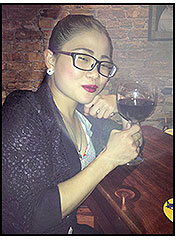 “Why you not want to marry Liang? Liang become old lady. Nobody want to marry Liang.”
“Why you not want to marry Liang? Liang become old lady. Nobody want to marry Liang.”
“You’re young. You’re beautiful. There are hundreds, thousands of guys out there who would marry you in a heartbeat.”
“Liang look hard. Nobody want to marry Liang.”
“Well, Liang, I’m sorry for your predicament but it’s not going to be me.” And left it at that.
Liang has a forceful personality and at times it nearly bowled me over. I could feel energy radiate from her diminutive frame when she brushed against me. She would be very sweet and loving one minute, and then the next minute she would treat me like a total stranger.
Liang’s English vocabulary was extraordinary. She knew every colloquialism, slang, insulting and foul word in the book and she did not hesitate to use them when it fit her purpose. Even though her English was a little broken at times, her use of expressions such as “blah, blah, blah,” or the way she would occasionally refer to me and Jim as “you faggots” sounded more hilarious to me than insulating. I commended her on her use of the language.
After a while Liang stopped acting like an opportunist and returned to being a normal human being. That was refreshing and she didn’t bring up the subject of marriage again.
An hour passed and Liang had finally had it with Jim and me. She ditched us in search of other entertainment. For the next while I enjoyed a couple of excellent IPAs that were on tap, and then we headed to a local Spanish restaurant for something more substantial.
After a bowl of menudo and some smooth shots of tequila (that left us both in a haze), we stopped by the Toadstool where we met up with Marsha. She, her best friend April (both brown-skinned beauties from Belize) and I had shared a large apartment at the Embassy Suites in Deerfield Beach during my “Surfing Safari” some years ago.
I watched in utter stupefaction (and horror) as Jim and Marsha exchanged pleasantries and then proceeded to perform one of the funniest and most bizarre acts of improvisation I have ever seen.
What if, Jim suggested, people – instead of going through rigid, contrived motions when they enter a bar — instead approached each other in the most lewd and suggestive manner imaginable?
“How ya’ doin’,” Jim said to Marsha, stroking an imaginary huge erection.
“I’m doin’ just fine,” Marsha replied touching herself over her clothing in a manner that was unmistakable.
Some very respectable young ladies stared wide-eyed at Jim and Marsha and, in a state of shock, got away from us as quickly as possible.
“Are you trying to get us kicked out of here?” I said, laughing hysterically. I don’t know if it was the Tequila or if you just “had to be there” but those two were comic gold.
Marsha was with her new friend, Felix, who must have thought we were crazy because he quickly escaped from our company to “have a smoke.” When he returned, Felix “had a word” with Marsha and then the two of them politely excused themselves.
Jim and I eventually ended up at Gabe’s, a bar adjoining the old Mary Jane Lanes, a bowling alley built in 1948. Jim got us in without paying by interrogating the bouncer, “Band? What band? There’s no band here! Why should we pay a cover charge?”
By the time we had found a nice place to sit by the bar, a band appeared out of nowhere and began setting up their equipment.
Soon the place was filled with the strains of hard driving rock and roll, and I, by God, wanted … needed to get out on the old hardwood dance floor and boogie.
If ever Jim was embarrassed to be around me when I got the urge to dance, he certainly wasn’t showing it that evening. It took a while but I finally found a suitable dance partner. She was at least a foot shorter than me but oh my, she could move with the music. She had arrived with her boyfriend but he, like just about every other guy at the bar, had absolutely no interest in getting on the floor. So he graciously “lent” me her for the evening and we tore the place up.
 When a dance was over, I headed back to my bar stool that Jim had kept empty. I felt like a prize fighter whose trainer was prepping me to head out into the ring. He had a towel to wipe me down; he massaged my back and my neck. “You’re doing great, Chuck!” he would say. “I want you to go out there and do it again. Everybody loves you! You’re amazing! You’re awesome. Don’t give up now! The music’s starting up again. Get out there and DANCE.”
When a dance was over, I headed back to my bar stool that Jim had kept empty. I felt like a prize fighter whose trainer was prepping me to head out into the ring. He had a towel to wipe me down; he massaged my back and my neck. “You’re doing great, Chuck!” he would say. “I want you to go out there and do it again. Everybody loves you! You’re amazing! You’re awesome. Don’t give up now! The music’s starting up again. Get out there and DANCE.”
I was feeling good. Sometimes, in the background, I could hear the crowd clap and howl for me to dance. My partner was keeping up with me; she was following like a good dance partner should and we were both glowing with broad smiles on our faces. I put to good use every step that my dance teacher had taught me when I was taking private lessons a couple years back. I did the send outs, the turns and all the moves whose names I have forgotten but that came back instinctively while I was under the influence of the great god tequila! And I didn’t mean to make a spectacle of myself: I was just having a good time. “You were the best part of the show,” Jim said.
There came a point when my dance partner and I were exhausted and the dance floor became so full of drunken onlookers that there really was no place to move. They pushed us toward the musicians and our safety was threatened by electrical cables and cords. That’s when I lost my balance and fell, but caught myself at the last second, and that’s when my dance partner and I decided to call it a night.
I had danced! I had exorcized all the demons from my soul. But…I needed to get some air, to escape the crowd that was growing denser and noisier and more confused with every passing minute.
I walked outside Gabe’s, sat down on the curb and tried to collect myself. My heart rate and body temperature came back to normal as I breathed in the fresh, cool air.
I was ready to go home now, but when I re-entered the bar Jim was nowhere in sight. I reached for my cellphone, which was usually attached to a lanyard around my neck. The lanyard was still there but the phone was not. It had disappeared into thin air.
I noticed that I still had the keys to the Mercedes dangling from the “Key Safe” metal clip I always keep attached to my leather belt. I waited around for a few minutes and, not knowing not what else to do, decided to leave the bar and head — God knows where.
The tequila had pretty much taken possession of my mental faculties and I was now operating on auto pilot. I was not stumbling and I did not feel the least bit sick. I just wanted to get away from the bar.
And so I headed out into the foggy night. It was the third week of June and one would have thought that it would be hot and humid but no, it was cool. I was dressed for the weather so I wasn’t worried about catching a cold. I had left my raincoat in the back of the Mercedes but it seemed that, after the afternoon’s biblical deluge, I would not be threatened by any more rain.
And so I walked into the quiet night. Oh so quiet compared to Albuquerque where one can always hear a plane overhead, a siren blaring or the drone of an expressway. Here, twenty miles outside of Chicago, nestled beside Lake Michigan, the silence and the darkness were comforting and I just kept walking deeper and deeper into it.
I must have walked for a mile when I realized I had no idea where I was and I was totally alone. I looked around, hoping to see some welcoming light amidst all that darkness.
I saw something in the distance and headed towards it, confident that this place would be my saving grace. Something inside me intuitively guided my steps and, within a half hour I reached it.
The Miramar is a high end Cuban restaurant, masterfully remodeled in such a way that it preserved the architectural details of its proud past — its tin roof, its frosted, wood-trimmed glass, its ceramic tile that lined the walls. I walked inside and found a bartender cleaning up after a long night. The place was virtually empty.
“I’m lost,” I said. “My friend comes here often. He’s a good customer. I need you to help me find his house. Please.”
“Where does he live?”
“He lives, um. He lives….” I couldn’t remember the name of the street so I pulled out my wallet, checked my little address book and told him.
“That’s right up the street. Couldn’t be more than half a mile. You’ll be there in no time.”
I thanked him and headed back out into the darkness. I did exactly what he told me to do and, sure enough, I found Jim’s house. But, unfortunately, the doors were securely locked. I saw a couple vinyl-strapped, chaise lounge beach chairs in the driveway and collapsed into one of them. “It’s going to be a long night,” I told myself.
And then, as I came to terms with my situation and started to feel the cool air sink into my bones I thought, “Hey wait a minute, I have Jim’s car keys. Maybe there’s a house key, as well.”
I got up and made my way to the door and, one after the other, tried my luck. There must have been at least a dozen keys on that chain and it took me a while to find the right one. But I did find the one that fit the lock and the door opened wide.
Ruby, the family’s venerable bull terrier, raced into the house before I had a chance to enter. She must have been outside all night and was glad to dive into her little bed. And I, of course, was thrilled to get in out of the cold. I left the keys on the kitchen counter and made a point of keeping the front door unlocked so that if and when Jim returned home, he would be able to walk right in.
I climbed the stairs, collapsed onto my bed and fell into a deep, restful sleep.
The next morning I awoke feeling refreshed, renewed and a bit pissed off at Jim. How could we have gotten separated from each other? And what was the deal with my missing cellphone? I vaguely remember him asking me to give it to him after I started dancing. Or maybe I gave it to him — after all, it did have a way of cramping my style.
I confronted him in the kitchen and accused him of deserting me.
Jim was dressed in a bathrobe and was making coffee. Without saying good morning I began giving him the third degree.
“I don’t remember much. I fell on my hip,” he said softly.
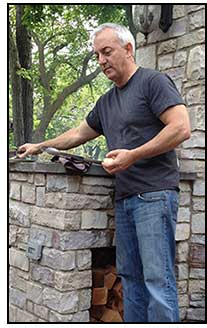 Jim was hung over and clearly did not want to engage with me. The more I listened to myself whine, the more I realized that my version of the story was a bit on the flimsy side. Did I have this all backwards? Was I actually the deserter last night? After all, he did arrive home after me, and it’s not like I went out of my way to find him. I could have borrowed a cellphone at the bar and called him.
Jim was hung over and clearly did not want to engage with me. The more I listened to myself whine, the more I realized that my version of the story was a bit on the flimsy side. Did I have this all backwards? Was I actually the deserter last night? After all, he did arrive home after me, and it’s not like I went out of my way to find him. I could have borrowed a cellphone at the bar and called him.
And as far as my iPhone 4s was concerned, Jim had given that to me some time ago and I had become totally addicted to it. Was I so attached to that piece of electronics that I was willing to act like a pathetic loser in order to get it back? I started to feel ashamed of myself the moment I began berating him.
“Shhhhh,” said Jim. “The solution to this problem is to call your number.” He dialed my cell phone. “I hear something: Quiet!”
And sure enough, buried deep within a cabinet in the kitchen we could hear the sound of a faint vibration. We began checking all the cabinets and Jim finally located the iPhone buried deep under a stack of dish towels. What the hell was it doing there?
I was relieved when Jim handed the phone back to me. I noticed that he had removed the labels I had plastered all over it. Labels that said, “This phone belongs to Charles Reuben,” complete with my address, landline and e-mail. He had taken pains to make it look a lot less dorky.
“All I’m saying,” I said, “is that there is no reason that we should have walked back alone from the bar last night. We should have had each other’s backs.”
Having gotten the blame game out of my system, I was prepared to start another day. And on this day I would accompany Jim to his factory and put in an honest day’s work. After all, Jim had paid for my plane ticket (and the phone) and I wanted to show him my gratitude by helping him out in any way possible.
So, when we arrived at the office I ran errands, emptied garbage cans and worked on developing the company’s website. Midway through the morning Jim interrupted me as I was making my rounds with the large, wheeled garbage can and told me he needed some help on the factory floor.
“Stop emptying garbage and follow me.”
Jim led me to one of his big injection molding machines, reached into a box and pulled out a piece of plastic.
“You see this? Recognize it?”
“Not sure….”
“It’s a pill splitting device. It cuts pills in half.”
Jim showed me the ins and outs of running the machine (which was about the size of a large shipping container). Within 15 minutes I was operating it competently while it proceeded to spit out about 100 pill cutters an hour.
Most people would probably go crazy after 30 minutes of this monotonous work but I became more and more fascinated with the machine and its operation.
I had spent my entire professional life, since the age of about 16, working on and around newspaper presses. Jim had spent the same amount of time working around presses that molded the sort of things that people use on a daily basis.
Was the creation of the printed word any more or less important than the creation and distribution of the items that we all use every day? Most of us can live without a magazine, newspaper or website but see how long you’ll last without a toothbrush, a spoon or a fork!
And don't start about how the stuff we interact with on a daily basis is not art: Beauty and creative design surrounds us everywhere. We just need to open the eyes of our eyes to see it.
These were the thoughts that I was pondering as I became one with the great molding machine. The movements of my body became synchronized with that of the machine. It turned into a sort of dance and I started to enjoy it.
My reveries were soon interrupted, though, when one of the Mexican workers told me that I needed to take a break. I was taking the job of one of Jim’s employees and now he was sitting around, doing nothing. So I stepped away from the machine. Jim walked up to me, gave me the thumbs up and took me aside.
“I’ll pay you $17 an hour if you’ll quit your job and work for me,” he said.
“I don’t want your money,” I said quietly, but secretly I was thinking, “Geez Louise: Jim’s offering me more than I make as a webmaster in New Mexico!”
Later that day I started working on Jim’s company website in earnest. I made him a very basic, static HTLM5 site — old school — but it worked like a finely-tuned Swiss watch. I hadn’t brought my computer on the trip so I downloaded a free 30-day trial of Adobe Dreamweaver and Photoshop — the two programs necessary for making a good site from scratch — on Jim’s machine. Then I synchronized Dreamweaver with Jim’s web hosting company and spent a few hours teaching him how his new website worked and what he would need to do in order to maintain it.
Unlike most sites these days, the site that I made for Jim loaded immediately on any browser, worked reliably on all computer devices and could be navigated with ease. The site looked simple but there was actually a lot going on in it.
Jim said I was a good teacher but I’ve got to say that he was a much better learner. I have spent years studying Dreamweaver and Photoshop and I swear, Jim picked up the essentials in minutes and began modifying my basic design to suit his fancy within hours. I was very impressed. By the time we called it a day Jim had his company website up and running and as far as I could see, he had learned the basics of becoming a webmaster.
On the night before my departure, the teenagers descended upon the house — freshly scrubbed, immaculately groomed, and fashionably-dressed. There were a dozen of them and they made a bee-line to the living room and collapsed around the enormous, well-stuffed, wrap-around sofa in front of the big screen TV. They watched the TV flicker but didn’t pay it much attention. In the dim light the TV screen was like a bright council fire that spat tongues of flame on the mesmerized faces of teenagers at a pow-wow.
Brian was now just a regular teenage boy hanging out with his friends. He had abandoned his scout uniform and was wearing casual clothes; but since it was his house he was now playing the part of the generous host: Visible yet invisible, occasionally catering to the wants and needs of his guests, without becoming the centerpiece of attention.
They had attained the cusp of childhood. The boys were filled out and some had six-packs. The girls were full-figured, mascaraed, made-up, lightly perfumed. Both boys and girls were attentive to their appearances without going overboard. But unconsciously they were all subscribing to the dictates of Charles Darwin and his theory about survival of the fittest.
These were uncoupled, young and healthy human beings — all determined and destined to be coupled. But right now they were free, unencumbered with jobs and mortgages, and their worries were miniscule compared to those who paid their bills. They cracked silly jokes, made off-color, even funny comments: but mostly they basked in the warmth and the love that pervaded the living room. It would not be long before they were all off to college, finding jobs, getting married, having kids: repeating the endless cycle.
Jim was in his office, working on the computer, answering e-mails, paying bills, keeping the great ship of state afloat.
I wandered cautiously into this room of teenagers.
“Do you mind if I join you?” I asked timidly.
“Please do,” said a girl with long golden hair.
Room was made for me on the massive sofa and I squeezed between them. They didn’t expect me to be sociable and I did not feel awkward. They were not judgmental, they did not ask prying questions, they did not gossip. They were delightful company and they accepted me for who I was. For a while, I was one of them.
A couple hours later the teenagers left the house en masse, including Brian. They all picked up and left like a tribe of wandering gypsies.
“Where do they go?” I asked Jim after he had finished payroll and returned to the living room. “One minute they’re here and the next minute they’re gone.”
Jim turned to me knowingly and said, “That’s what they do.”
Thank you for visiting Chucksville. Please sign my guestbook.
Google search is simple: just type whatever comes to mind in the search box below and hit ENTER or click on the Google Search button. Google will then search the entire chucksville.com website for pages or documents that are relevant to your query!
|
|


